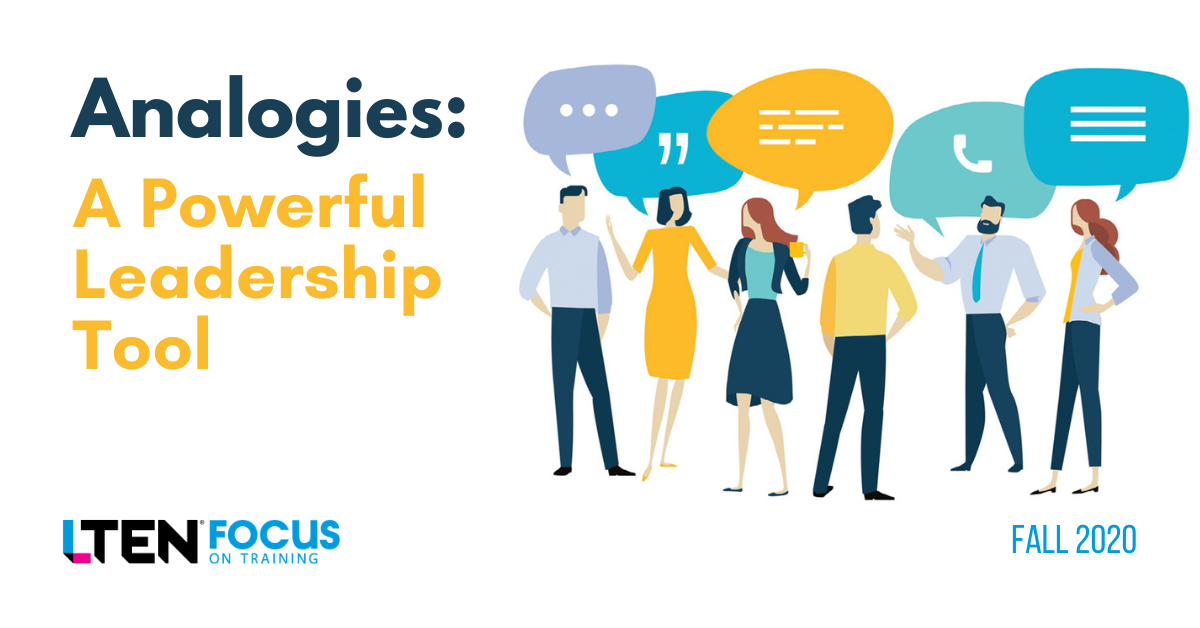
LEADERSHIP/MANAGEMENT DEVELOPMENT – By Amy Glass
Analogies: A Powerful Leadership Tool
Analogies serve as mental shortcuts that help us understand complex events.
Words are powerful: They help us make sense of life and our place in it. Leaders need to communicate with their words as much as their actions, which some do more effectively than others. The most powerful communicators use simple, conversational language, stories and analogies to help us understand our current reality and paint a vision for the future.
The word “analogy” is defined as a comparison between two things, typically for the purpose of explanation or clarification. Many of us negatively remember analogies from when we took the SATs – yet analogies are a powerful linguistic tool for leaders.
 “Neuroscientists have found that our brains process the world by associating the new or unknown with something familiar,” Carmine Gallo wrote in Harvard Business Review. “When presented with a novel idea, our brains don’t ask, ‘What is it?’ They ask, ‘What is it like?’ Analogies answer that question. They serve as mental shortcuts that help us understand complex events. Leaders who are great communicators in a crisis are skilled at finding analogies, because they have to persuade people to act quickly.”
“Neuroscientists have found that our brains process the world by associating the new or unknown with something familiar,” Carmine Gallo wrote in Harvard Business Review. “When presented with a novel idea, our brains don’t ask, ‘What is it?’ They ask, ‘What is it like?’ Analogies answer that question. They serve as mental shortcuts that help us understand complex events. Leaders who are great communicators in a crisis are skilled at finding analogies, because they have to persuade people to act quickly.”
 We are seeing powerful examples from scientists, business leaders and politicians as they help us to understand this historical moment:
We are seeing powerful examples from scientists, business leaders and politicians as they help us to understand this historical moment:
- The Fire Hose Analogy: New York Gov. Andrew Cuomo used an analogy on April 4, resurrecting President Franklin D. Roosevelt’s “fire hose” analogy to explain why it was in Oregon’s best interest to send ventilators to New York. “We’re all in the same battle,” he said. “You want to contain the enemy. Oregon could have a significant problem toward May. Our problem is now … Stop the fire where it
is before it gets to my home.” - The Basketball Analogy: Dr. Anthony Fauci, a former high school point guard,
ran with the basketball theme, putting the COVID-19 pandemic in hoops terms. When he appeared on Duke Coach Mike Krzyzewski’s weekly SiriusXM Radio show, Fauci described the pandemic this way: “Right now we have a team that’s a very powerful team, and that’s the virus. What we need to do is we’ve got to play a full-court press. We can’t let them get the ball on the ground to dribble. We’ve just got to be all over them … We’re not even at halftime, Coach K. We’re just fighting it out.” - The Muscle Analogy: Dr. Andrew Badley, an infectious disease specialist at Mayo Clinic, told CNN on Aug. 10: “When we looked at the setting of COVID disease, we found that people who had prior vaccinations with a variety of vaccines appeared to have lower risk of getting COVID disease. It’s what immunologists call immune training … A good analogy is to think of your immune system as being a muscle, the more you exercise that muscle, the stronger it will be when you need it.”
Analogies are powerful tools. They make our messages more believable, relatable and memorable. Effective leaders will use analogies to help their teams process the current realities and better navigate for the future.
How can you effectively use analogies in your communication?
Here is a 4-step process to create your own powerful analogies:
- Identify the challenging concept, information or action you want to explain.
- Select an action you can compare to your situation. Some examples include:
-
- Playing poker.
- Going on vacation.
- Driving a car.
- Cooking a meal.
- Going to the gym.
- Shopping for groceries.
- Going on a date.
- List the ways the two topics are alike.
- Experiment with the best way to describe the comparison.
Amy Glass is owner & CEO of BRODY Professional Development. E-mail Amy at aglass@brodypro.com.









